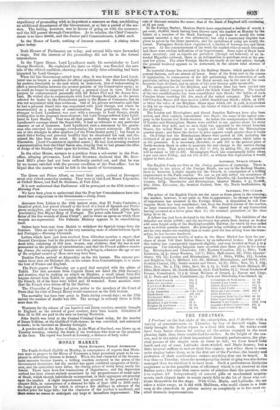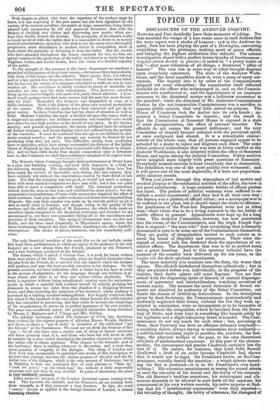THE THEATRES.
I Puritani on the last night of the subscription, and 11 Barbiere with s variety of entertainments on Thursday by way of farewell night, haae fairly brought the Italian Opera to a close this week. No works could have been better chosen for setting all the artists engaged in the most pleasing light, than these established favourites. In the height of the sea- son, and in the midst of their impassioned dramatic performances, the phy- sical powers of the singers seem at times to fail; we have heard Grid harsh and out of tune, Lablache short-winded, and Mario hoarse; but • little interval suffices to restore their fine organs; and when there is some quiet singing before them, as in the first act of the Puritani, the beauty and perfection of their combinations surpass anything that can be heard. It was thus on Tuesday, when the accompanying choral singing was also better managed than we recollect it to have been. Such a performance dissipates conjecture as to the possible term of efficiency which is yet reserved to this Italian corps; but even that seems easier of solution than the question, who is to replace it? Independently of natural gifts or mechanical acquirer ments, such elegant taste in music rarely falls to the lot of those who cul- tivate themselves for the stage. With Grisi, Mario, and Lablache, the art takes a wider range, as it did with Malibran, who could charm in a little song at the pianoforte in private society as completely as in her most ex- sited dramatic impersonations. With singers so gifted, who have the repertory of the modern stage by heart, it is not surprising if the past season has not been signalized by the variety of its musical novelties; the public at large, meanwhile, being better pleased with recognizing its old and approved favourites than with the fatigue of deciding new claims and discovering new merits, when per.. haps they hardly reward the trouble. The prosperity of the theatre is also so much involved with the ballet, that it is impossible to direct it on merely musical considerations; and they who wish to see the opera more thoroughly progressive, more stimulative to modern talent in composition, must at least admit the necessity of divorcing it from the ballet. But the crowds who have attended throughout the season represent far less, we fear, the actual votaries of the opera than of the ballet; and there is no doubt but that Taglioni, Cerito, and Lucile Grahn, have the voices of a decided majority of the public. To the strength of the manager in the latter department we attribute a great deal of the success of the present season,—for success there hasnndoubt- edly been, if full houses are the criterion. Three operas, Nino, I Lombardi, and at a late period Don Gregorio, have been heard. Verdi has been tried; but he has not the variety of a composer calculated to make an tens in even modern art. His excellence is chiefly confined to pieces of ensemble, his melodies are rare, and his style monotonous. Nino, however, served to bring up the reserve brigade, and parts of it justly found admirers. I Lom- bardi would perhaps have had more success had the part lain more favour- ably for Grisi. Donizetti's Don Gregorio was despatched at once, as a feeble imitation. Such is the history of the three new musical productions of the season. The standard operas have been rehearsed and got up in great variety. In these Castellan has had her share of attention as well as Grisi. Madame Castellan has made a decided advance this season both as a singer and an actress: her brilliant execution and beautiful voice would now place her in a high position on the boards of any opera. In the dresses, scenery, and general appointments, the operas produced have far eclipsed all former attempts; and heroic displays have not suffered from the poverty of the wardrobe. It must be confessed that the age is not brilliant in dra- matic musical novelty; and the manager can scarcely be blamed for not producing what does not exist. The difficulties arising from conflicting taste or prejudice, which have always surrounded the director of the Italian Opera in England, he has done his best to reconcile with fairness to all par- ties; and we have little doubt that should composition take a fortunate turn on the Continent, we shall have nothing to complain of its neglect here.



























 Previous page
Previous page